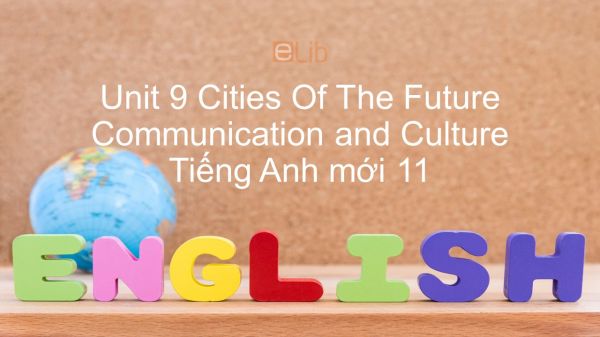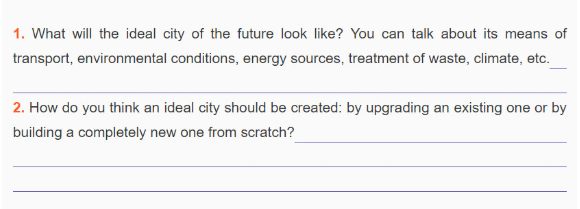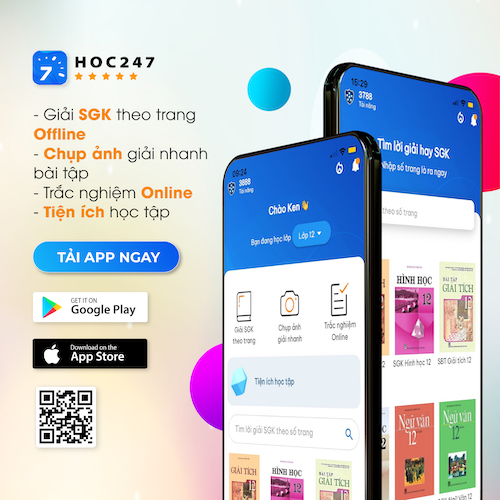Unit 9 lớp 11: Cities Of The Future - Communication and Culture
Bài học Unit 9 Lớp 11 mới phần Communication and Culture yêu cầu hoàn thành sơ đồ nói về một thành phố lý tưởng trong tương lai và cung cấp thông tin về thành phố thông minh -Songdo để các em đọc hiểu và trả lời câu hỏi. Để hiểu rõ hơn, mời các em theo dõi bài học.
Mục lục nội dung

1. Communication
1.1. Task 1 Unit 9 lớp 11
Use the information about the cities mentioned in this unit (London, Tokyo, New York City, and Superstar City) and complete the diagram about the ideal city of the future. (Em hãy dùng thông tin nói về các thành phố được nói đến trong bài học (London, Tokyo, New York City, và Superstar City) và hoàn thành sơ đồ nói về một thành phố lý tưởng trong tương lai)
Guide to answer
The ideal city of the future (Thành phố lý tưởng của tương lai)
1. Main means of transport: (Phương tiện vận chuyển chính)
Public transport (eco-buses / smart underground transport networks) (Phương tiện công cộng: xe buýt thân thiện với môi trường/ hệ thống vận chuyển dưới lòng đất thông minh)
2. Sources of energy: (Nguồn năng lượng)
Renewable sources of energy: wind and sun power. (Nguồn năng lượng tái tạo: năng lượng gió và năng lượng mặt trời)
3. Treatment of waste: (Xử lý chất thải)
- Water is treated and turned into energy or fertilizers. (Nước được xử lý và chuyển đổi thành năng lượng hoặc phân bón)
- Wastewater is treated and turned into drinking water. (Nước bẩn được xử lý và chuyển đổi thành nước uống)
1.2. Task 2 Unit 9 lớp 11
Discuss the questions in groups. (Thảo luận các câu hỏi dưới đây theo nhóm.)

Tạm dịch:
1. Thành phố lý tưởng của bạn trong tương lai sẽ như thế nào? Bạn có thể nói về các phương tiện giao thông, điều kiện môi trường, nguồn năng lượng, xử lý chất thải, khí hậu, vv
2. Bạn nghĩ rằng một thành phố lý tưởng nên được tạo ra như thế nào: bằng cách nâng cấp hiện tại hoặc bằng cách xây dựng hoàn toàn mới từ đầu?
Guide to answer
1. The ideal city of the future is the one with modern public transports which will all be run by solar energy. Environmental problems will decrease because of government’s efforts. Renewable energy will be used widely in low cost so that people can afford it. Waste will aslo be treated by smart system and high technology. (Thành phố lý tưởng của tương lai là một thành phố với những phương tiện giao thông công cộng hiện đại mà tất cả sẽ được chạy bởi năng lượng mặt trời. Các vấn đề về môi trường sẽ giảm nhờ những nỗ lực của chính phủ. Năng lượng tái tạo sẽ được sử dụng rộng rãi với chi phí thấp để mọi người có thể mua được nó. Chất thải sẽ được xử lý bằng hệ thống thông minh và công nghệ cao.)
2. An ideal city should be created by both upgrading an existing one and by building a completely new one from scratch. (Một thành phố lý tưởng cần được tạo ra bằng cả hai cách cách nâng cấp cái hiện tại và xây dựng một cái mới hoàn toàn từ đầu.)
2. Culture
2.1. Task 1 Unit 9 lớp 11
Read the text about Songdo, a smart city, and complete the table below. (Hãy đọc bài viết nói về Songdo, một thành phố thông minh rồi hoàn thành bảng bên dưới.)
Guide to answer

Songdo International Business District in South Korea was started from scratch in 2005 and is still being built for the future. Its construction is based on the world’s best technologies and eco-friendly practices.
Located about 60 km southwest of Seoul, this 53.3-square-kilometre eco city has been planned around a central park and designed so that every resident can walk to work in the business district. People can enjoy walking in the city park or riding bicycles in the city.
The waste disposal system here is also innovative. There are no rubbish trucks or waste disposal bins in the streets. Instead, all household and office waste is sent directly through an underground network of tunnels to waste processing centres. The waste is then automatically sorted, deodorised and treated. The aim is to eventually convert it into renewable energy for the community.
Sensors are widely used to monitor temperature, energy use and traffic flow. These sensors can warn the local authority about any problems and allow inhabitants to control the heating systems or household devices.
High-speed Wi-Fi is provided everywhere. Government offices and schools are connected to the network. This allows office workers to use teleconferencing for meetings and students to attend classes at home.
Attracting inhabitants, however, has been slow. Five years after its launch, only about 20% of the commercial space was occupied. But the developers are very optimistic about this city of the future. By 2020, they predict that more than 65,000 people will live and work in Songdo. They believe that it is on the right track to become one of the smartest and greenest cities in the world.
Tạm dịch:
Khu kinh doanh quốc tế Songdo ở Hàn Quốc bắt đầu từ đầu năm 2005 và vẫn đang được xây dựng cho tương lai. Kiến trúc của nó là dựa trên công nghệ tốt nhất thế giới và thực hành thân thiện với sinh thái.
Nằm cách Seoul khoảng 60 km về phía tây nam, thành phố sinh thái 53.3 km2 này đã được lên kế hoạch xung quanh công viên trung tâm và được thiết kế để mọi người có thể đi dạo đến làm việc trong khu kinh doanh. Mọi người có thể thưởng thức đi dạo trong công viên thành phố hoặc đi xe đạp trong thành phố.
Hệ thống xử lý chất thải ở đây cũng là sáng kiến. Không có xe chở rác hay thùng rác trên đường phố. Thay vào đó, tất cả các hộ gia đình và rác thải văn phòng được gửi trực tiếp qua đường hầm tới các trung tâm xử lý chất thải. Chất thải sau đó được tự động sắp xếp, khử mùi và xử lý. Mục đích là để cuối cùng chuyển đổi nó thành năng lượng tái tạo cho cộng đồng.
Cảm biến được sử dụng rộng rãi để theo dõi nhiệt độ, sử dụng năng lượng và lưu lượng giao thông. Những cảm biến này có thể cảnh báo chính quyền địa phương về bất kỳ vấn đề nào và cho phép người dân kiểm soát các hệ thống sưởi ấm hoặc các thiết bị gia đình.
Tốc độ Wi-Fi cao được cung cấp ở mọi nơi. Các văn phòng chính phủ và trường học được kết nối với mạng. Điều này cho phép nhân viên văn phòng sử dụng dịch vụ hội nghị qua điện thoại cho các cuộc họp và sinh viên để tham dự các lớp học ở nhà.
Thu hút người dân, tuy nhiên, đã được làm chậm lại. Năm năm sau khi ra mắt, chỉ có khoảng 20% diện tích thương mại đã bị chiếm đóng. Nhưng các nhà phát triển rất lạc quan về thành phố này của tương lai. Đến năm 2020, họ dự đoán rằng hơn 65.000 người sẽ sống và làm việc tại Songdo. Họ tin rằng nó đang đi đúng hướng để trở thành một trong những thành phố thông minh và xanh nhất trên thế giới.
2.2. Task 2 Unit 9 lớp 11
Decide whether the following statements about Songdo arc true (T), false (F)? or not given (NG). Tick the correct box. (Những lời phát biểu dưới đây đúng (T), sai (F), hay không có thông tin (NG). Đánh dấu vào ô đúng.)
Guide to answer
1 – F. Songdo is a city developed from an existing one. (Songdo là một thành phố được phát triển từ một thành phố hiện có.)
2 – T. The most advanced technologies are used in the construction of Songdo. (Các công nghệ tiên tiến nhất được sử dụng trong việc xây dựng Songdo.)
3 – NG. Special bicycle lanes are designed for Songdo's inhabitants. (Tuyến xe đạp đặc biệt được thiết kế cho người dân của Songdo.)
4 – F. Rubbish trucks collect household and office waste and transport it to processing centres every day. (Xe chở rác thu gom rác thải gia đình, văn phòng và vận chuyển nó đến trung tâm chế biến hàng ngày.)
5 – T. Songdo's traffic can be controlled with the help of sensors. (Giao thông của Songdo có thể được kiểm soát với sự trợ giúp của cảm biến.)
6 – T. The Wireless Internet network covers the whole city. (Mạng Internet không dây phủ toàn bộ thành phố.)
7 – NG. Five years after the opening of the city, most of its residential space was occupied. (Năm năm sau khi mở thành phố, hầu hết không gian cư trú của nó đã bị chiếm đóng.)
2.3. Task 3 Unit 9 lớp 11
Discuss with a partner (Thảo luận với bạn bên cạnh)
Would you live in Songdo if you had a chance? Why or Why not? (Bạn có sống ở Songdo nếu bạn có cơ hội? Tại sao hoặc Tại sao không?)
Guide to answer
Students' answers
3. Practice Task 1
Mark the letter A, B, C, or D to indicate the sentence that best combines each pair of sentences in the following questions.
Question 1: “Go on Jack, apply for the job” said Mary.
A. Mary told Jack to go on and apply for the job.
B. Mary suggested applying for the job.
C. Mary said that Jack would apply for the job.
D. Mary encouraged Jack to apply for the job.
Question 2: I hardly know the truth about Jean’s success in the institute.
A. I do not know much about Jean’s success in the institute.
B. It is difficult for Jean to be successful in the institute.
C. Jean’s success in the institute was not to be known.
D. Jean hardly become known and successful in the institute
Question 3: The old man is working in this factory. I borrowed his bicycle yesterday.
A. The old man is working in this factory which I borrowed his bicycle yesterday.
B. The old man whom I borrowed his bicycle yesterday is working in this factory.
C. The old man whose bicycle I borrowed yesterday is working in this factory.
D. The old man whom is working in this factory I borrowed his bicycle yesterday.
Question 4: Mary doesn’t like sport. Her two brothers don’t, either.
A. Neither Mary or her two brothers like sport.
B. Either Mary nor her two brothers likes sport.
C. Neither Mary nor her two brothers like sport.
D. Either Mary or her two brothers like sport.
Question 5: Some kinds of fish live in fresh water. Others live in sea water.
A. Some kinds of fish live in fresh water, for others live in sea water.
B. Some kinds of fish live in fresh water, so others live in sea water.
C. Some kinds of fish live in fresh water, or others live in sea water.
D. Some kinds of fish live in fresh water, and others live in sea water.
4. Practice Task 2
Mark the letter A, B, C, or D to indicate the word whose underlined part differs from the other three in pronunciation in each of the following questions.
Question 1: A. dweller B. overcrowded C. network D. waste
Question 2: A. commeruial B. electriuity C. advanued D. prouessing
Question 3: A. inhabitant B. geography C. radiation D. available
Question 4: A. upgrade B. presentation C. description D. consumption
Question 5: A. disposal B. optimistic C. population D. occupy
Để ôn tập các từ vựng và các điểm ngữ pháp giúp phát triển kĩ năng giao tiếp, mời các em đến với phần trắc nghiệm Unit 9 Communication and Culture Tiếng anh 11 mới sau đây và cùng luyện tập.
6. Conclusion
Kết thúc bài học Unit 9 Tiếng Anh lớp 11 mới – Communication and Culture, các em học sinh cần nắm được thông tin về các thành phố tương lai được đề cập trong Unit và đọc hiểu về thành phố thông minh - Songdo; đồng thời đưa ra ý kiến liệu các em có muốn sống ở thàn h phố đó không.
Tham khảo thêm
- doc Unit 9 lớp 11: Cities Of The Future - Getting Started
- doc Unit 9 lớp 11: Cities Of The Future - Language
- doc Unit 9 lớp 11: Cities Of The Future - Reading
- doc Unit 9 lớp 11: Cities Of The Future - Speaking
- doc Unit 9 lớp 11: Cities Of The Future - Listening
- doc Unit 9 lớp 11: Cities Of The Future - Writing
- doc Unit 9 lớp 11: Cities Of The Future - Looking Back
- doc Unit 9 lớp 11: Cities Of The Future - Project
